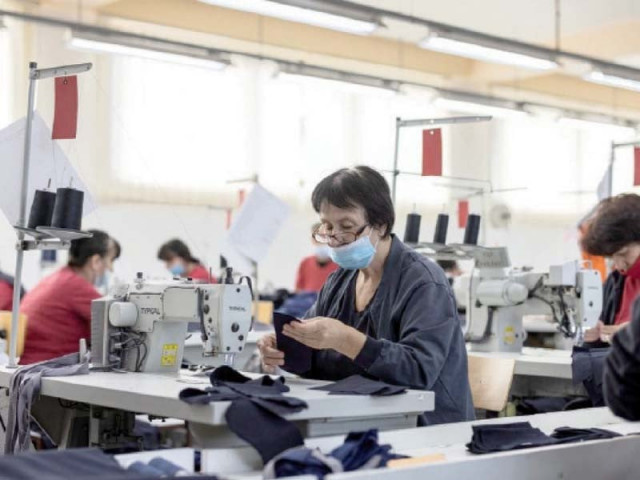Policy withdrawal draws criticism
Textile industry says planned move will dent exports, widen trade deficit

Textile exporters have expressed serious concern over the planned withdrawal of Textile Policy 2020-25 in the wake of “harsh measures” being taken by the Ministry of Finance to revive the economy and the International Monetary Fund (IMF) loan programme.
In a joint statement on Tuesday, Pakistan Apparel Forum Chairman Mohammad Jawed Bilwani termed the move unwise and reckless.
“The proposal comes at a time when the textile export industry is in a take-off mode and businessmen are looking to boost exports,” he said. “Withdrawal of the policy will destroy the textile sector, dent exports, slash foreign exchange reserves and encourage businessmen to shift industries to some other country.”
He noted that the textile exporters were disappointed and burdened with one adverse decision after another and as a result they were planning to shift their business to foreign countries where they could work and expand their enterprises peacefully.
Government’s decision to withdraw the policy would prove to be the “deadliest U-turn” in the history of Pakistan because it would not only sabotage efforts of the value-added textile exporters but would also destroy the textile base.
Talking about the issue, Arif Habib Limited analyst Arsalan Hanif told The Express Tribune that the primary purpose of policies should be to steer sustainability in decisions for the next five years.
“If there is no consistency in policy, then there will be no new investment,” he voiced concern.
Pakistan Knitwear Sweaters Exporters Association Chairman Aitazaz Ahmed Japanwala said that the policy was approved with the consent of Prime Minister Imran Khan, who agreed, in principle, to all recommendations of the textile exporters.
“From time to time, the commerce and finance ministries also gave their assurance of complete support in this regard,” he said. “The implementation of the recently approved third textile policy had been pending since 2019 and now it seems that all efforts will prove to be futile.”
The Pakistan Readymade Garments Manufacturers and Exporters Association (PRGMEA) called for reversal of the policy withdrawal decision because swift implementation of the policy was vital for new investment in the export-oriented sectors of Pakistan.
“Withdrawal of this policy will deal a blow to the value-added garments sector,” noted PRGMEA North Zone Chairman Sheikh Luqman Amin in a letter written to PM Khan on Tuesday. “It is also against the prime minister’s vision of promoting exports.”
He lamented that Pakistan was already lagging behind regional countries in terms of exports and withdrawal of the policy would lead to contraction of exports besides widening the already ballooning trade deficit.
He was of the view that a long-term policy would give investors a clear signal that the government was ready to support the apparel sector.
He stressed the need to introduce a proper policy for the textile sector and cited that the industry contributed about 60% to the country’s total exports, besides providing jobs to millions of people.
“At present, the industry is working below capacity and several exporters are refusing export orders,” he said.
On the flip side, Arif Habib Commodities CEO Ahsan Mehanti said that the Textile Policy 2020-25 was a burden on the government and other industries were at a disadvantage due to the policy.
He noted that the ultimate aim of the policy had been achieved, ie revival of the textile sector.
“The government has to fulfill IMF conditions and align the textile policy with the industrial policy to control the fiscal deficit,” said Mehanti.
He stressed that attention should be paid to new sectors to maintain or lift foreign exchange reserves and exports once the textile policy was withdrawn. According to him, IT services, cement and agriculture sectors could fill the gap left by reversal of the textile policy.
Published in The Express Tribune, January 5th, 2022.
Like Business on Facebook, follow @TribuneBiz on Twitter to stay informed and join in the conversation.



















COMMENTS
Comments are moderated and generally will be posted if they are on-topic and not abusive.
For more information, please see our Comments FAQ